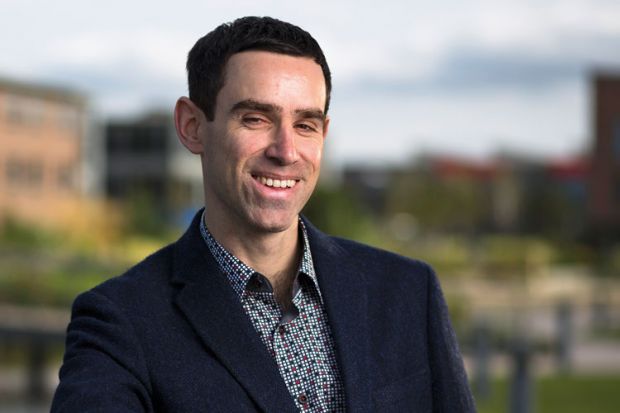James Byrne is a poet and lecturer in creative writing at Edge Hill University. He was previously poet in residence at Clare Hall, Cambridge. He is the author of two poetry collections in the UK, Blood/Sugar and White Coins, and is the editor of poetry journal The Wolf, which he co-founded in 2002. On 1 December, his latest collection, Everything Broken Up Dances, was published in the US, making him one of the first British poets of his generation to have a single volume of his work published in the country.
Where and when were you born?
I was born in Buckinghamshire in 1977 at 8.23 in the morning. My brothers – one elder, the other younger – were born at the same time.
How has this shaped you?
The timing? Well, of course I’m an early riser! Being a Bucks boy? That’s more complicated to explain. But I knew I wanted to get out as soon as I could think straight.
Describe the feeling when you learned that your collection was going to be published in the US?
I was elated and relieved, partly because much of the book was written while living in the US. It was doubly pleasing because few, if any, poets of my generation have a collection out in America. Hopefully, if the book does well enough, it might lead to other voices from England being published transatlantically. There’s some very good poetry being written here in the UK, but it’s not always made visible.
How significant is your US publication for your contemporaries? Does the US market represent the biggest challenge for younger poets?
Good question. We’ll see. I don’t know if British poetry is consistently as aware as it might be of what is happening beyond a multitude of homespun prizes, festivals, awards, readings. Also, for me, publishing internationally signifies a deeper connection to literature, beyond the UK and the US. I have always been interested in meeting poets who work in other languages. I’m collaborating with poets from Burma/Myanmar, Croatia and Syria at the moment on several translational projects.
Reading your work has been described as akin to “gulping firewater shots of the world”. How do you respond to praise such as this?
Heady embarrassment at first, perhaps! But Forrest Gander said it, so I’d better take it seriously. He’s one of the great American poets writing today, someone I admire as a poet and translator and for the (po)ethics behind his own approach to writing. My publishers are pleased and, of course, it’s a fantastic blurb for the back cover.
Does that kind of assessment ring true with what you set out to achieve in your poetry?
Partially, I suppose. It’s a quote from a longer blurb that talks about how the language I deploy attempts this. Also, ‘shots of the world’ could be a punning on the importance of observation, which is crucial to this particular book. But observation [alone] is never enough to make a poem exceptional. I try to give something of myself away in everything I write, freely. Of course there are many ways to do this.
Where is creative writing’s place in the higher education sector? Do you agree with some people’s opinions that creative writing degrees are “totally worthless”?
You’re quoting back to me [Hanif] Kureishi’s grumpy THE interview, right? Well, such ideas are downright miserablist, poisonous really, feeding on negative ideas that the wider establishment might have of specialist degrees like creative writing. As a writer, he should know better. Many good writers come through creative writing degrees; others don’t. There’s no sure-fire guarantee to ‘make it’.
With the proliferation of Kindles and the rise in popularity of populist fiction, what is poetry/the poetry anthology’s position in the wider literary landscape?
From what I hear, there’s actually been something of a resistance to digital publishing of late when it comes to poetry purchases. The audience for poetry is somewhat stifled and small compared with most genres. But it’s pleasing to know that people still want the physical artefact. Reading online is an altogether different experience, isn’t it? I don’t like reading books online because it hurts my eyes.
What advice would you give to your younger self?
Puncture the football, sit down and read everything.
Tell us about someone you’ve always admired.
Ever since I met him, my father-in-law, Dr Sucha Parmar. A man so honourable and kind, a great father to my wife, and now to me. He was born in a small Punjabi village and had no mother and no shoes; now he is one of the leading chemists in his field. He’s a spur, and I am trying to be half the man he is.
As a child, what did you want to do when you grew up?
A myriad of trivial things, from spy to stuntman. But I knew I wanted to write poetry as soon as I read Dylan Thomas and Allen Ginsberg at 12 years old.
What kind of undergraduate were you?
Awkward, creative, uncertain of the world.
Can you write us a short poem?!
Sorry, I don’t write on command, I write for myself. But I’d like to flag up a four-line poem in White Coins written for a Burmese friend, the venerable poet Maung Pyiyt Min. It was preceded by my asking him, the last time I was in Yangon, ‘What is the most beautiful thing you have ever seen?’ He mentioned a toad wet with rain that reappeared out of the camouflage of rainwater, ‘imperious as the lake herself’. I took it as a lovely metaphor for Aung San Suu Kyi.
Appointments
Philip Ingham, a geneticist renowned for his contributions to some of the most influential discoveries in developmental biology, has been appointed inaugural director of the Living Systems Institute at the University of Exeter. Professor Ingham is currently Toh Kian Chui distinguished professor and vice-dean for research at the Lee Kong Chian School of Medicine in Singapore. The LSI, a £52 million next-generation, collaborative research community, is due to open in autumn 2016. “The LSI will pioneer some of the most innovative and engaging approaches to understanding diseases and how they can be better diagnosed, and I look forward to working with my new colleagues in this vital research,” Professor Ingham said.
The University of Lincoln has appointed Susan Rigby to the new post of deputy vice-chancellor (student development). She joins from the University of Edinburgh, where she was vice-principal for learning and teaching. Professor Rigby will keep tabs on the student journey from applicant to alumnus/alumna. “Lincoln has a well-earned reputation for innovation in teaching and learning,” she said. “I look forward to working with colleagues across the institution to build on this expertise and, of course, to meeting students and listening to their ideas and aspirations for their university.”
Krzysztof Fijalkowski, senior lecturer in fine art at Norwich University of the Arts, has been awarded a chair in visual culture in recognition of his distinguished career as an educator and researcher.
The University of Wales Trinity Saint David has announced two appointments. Peter Rabbett has joined as professor of educational leadership, while Mererid Hopwood has been promoted to professor of education.
Susan Mitchell has been named chief operating officer of the University of the West of Scotland. Ms Mitchell, who is currently director of corporate services at Police Scotland, will take up her role in January.
POSTSCRIPT:
Print headline: HE & me
Register to continue
Why register?
- Registration is free and only takes a moment
- Once registered, you can read 3 articles a month
- Sign up for our newsletter
Subscribe
Or subscribe for unlimited access to:
- Unlimited access to news, views, insights & reviews
- Digital editions
- Digital access to THE’s university and college rankings analysis
Already registered or a current subscriber?









